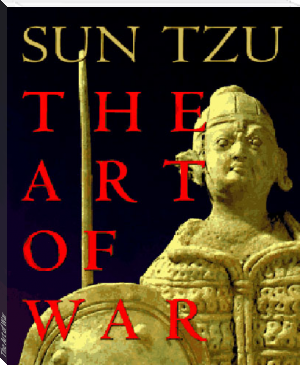The Art of War - Zi Sun (best books to read for success .txt) 📗

- Author: Zi Sun
- Performer: 0976072696
Book online «The Art of War - Zi Sun (best books to read for success .txt) 📗». Author Zi Sun
8. MEI YAO-CH`EN (1002-1060), commonly known by his "style" as Mei Sheng-yu, was, like Tu Mu, a poet of distinction. His commentary was published with a laudatory preface by the great Ou-yang Hsiu, from which we may cull the following: —
Later scholars have misread Sun Tzu, distorting his words and trying to make them square with their own one-sided views. Thus, though commentators have not been lacking, only a few have proved equal to the task. My friend Sheng-yu has not fallen into this mistake. In attempting to provide a critical commentary for Sun Tzu's work, he does not lose sight of the fact that these sayings were intended for states engaged in internecine warfare; that the author is not concerned with the military conditions prevailing under the sovereigns of the three ancient dynasties, [43] nor with the nine punitive measures prescribed to the Minister of War. [44] Again, Sun Wu loved brevity of diction, but his meaning is always deep. Whether the subject be marching an army, or handling soldiers, or estimating the enemy, or controlling the forces of victory, it is always systematically treated; the sayings are bound together in strict logical sequence, though this has been obscured by commentators who have probably failed to grasp their meaning. In his own commentary, Mei Sheng-yu has brushed aside all the obstinate prejudices of these critics, and has tried to bring out the true meaning of Sun Tzu himself. In this way, the clouds of confusion have been dispersed and the sayings made clear. I am convinced that the present work deserves to be handed down side by side with the three great commentaries; and for a great deal that they find in the sayings, coming generations will have constant reason to thank my friend Sheng-yu.
Making some allowance for the exuberance of friendship, I am inclined to endorse this favorable judgment, and would certainly place him above Ch`en Hao in order of merit.
9. WANG HSI, also of the Sung dynasty, is decidedly original in some of his interpretations, but much less judicious than Mei Yao-ch`en, and on the whole not a very trustworthy guide. He is fond of comparing his own commentary with that of Ts`ao Kung, but the comparison is not often flattering to him. We learn from Ch`ao Kung-wu that Wang Hsi revised the ancient text of Sun Tzu, filling up lacunae and correcting mistakes. [45]
10. HO YEN-HSI of the Sung dynasty. The personal name of this commentator is given as above by Cheng Ch`iao in the TUNG CHIH, written about the middle of the twelfth century, but he appears simply as Ho Shih in the YU HAI, and Ma Tuan-lin quotes Ch`ao Kung-wu as saying that his personal name is unknown. There seems to be no reason to doubt Cheng Ch`iao's statement, otherwise I should have been inclined to hazard a guess and identify him with one Ho Ch`u-fei, the author of a short treatise on war, who lived in the latter part of the 11th century. Ho Shih's commentary, in the words of the T`IEN-I-KO catalogue, "contains helpful additions" here and there, but is chiefly remarkable for the copious extracts taken, in adapted form, from the dynastic histories and other sources.
11. CHANG YU. The list closes with a commentator of no great originality perhaps, but gifted with admirable powers of lucid exposition. His commentator is based on that of Ts`ao Kung, whose terse sentences he contrives to expand and develop in masterly fashion. Without Chang Yu, it is safe to say that much of Ts`ao Kung's commentary would have remained cloaked in its pristine obscurity and therefore valueless. His work is not mentioned in the Sung history, the T`UNG K`AO, or the YU HAI, but it finds a niche in the T`UNG CHIH, which also names him as the author of the "Lives of Famous Generals." [46] It is rather remarkable that the last-named four should all have flourished within so short a space of time. Ch`ao Kung-wu accounts for it by saying: "During the early years of the Sung dynasty the Empire enjoyed a long spell of peace, and men ceased to practice the art of war. but when [Chao] Yuan-hao's rebellion came [1038-42] and the frontier generals were defeated time after time, the Court made strenuous inquiry for men skilled in war, and military topics became the vogue amongst all the high officials. Hence it is that the commentators of Sun Tzu in our dynasty belong mainly to that period. [47]
Besides these eleven commentators, there are several others whose work has not come down to us. The SUI SHU mentions four, namely Wang Ling (often quoted by Tu Yu as Wang Tzu); Chang Tzu- shang; Chia Hsu of Wei; [48] and Shen Yu of Wu. The T`ANG SHU adds Sun Hao, and the T`UNG CHIH Hsiao Chi, while the T`U SHU mentions a Ming commentator, Huang Jun-yu. It is possible that some of these may have been merely collectors and editors of other commentaries, like Chi T`ien-pao and Chi Hsieh, mentioned above.
Appreciations of Sun Tzu ————————————
Sun Tzu has exercised a potent fascination over the minds of some of China's greatest men. Among the famous generals who are known to have studied his pages with enthusiasm may be mentioned Han Hsin (d. 196 B.C.), [49] Feng I (d. 34 A.D.), [50] Lu Meng (d. 219), [51] and Yo Fei (1103-1141). [52] The opinion of Ts`ao Kung, who disputes





Comments (0)